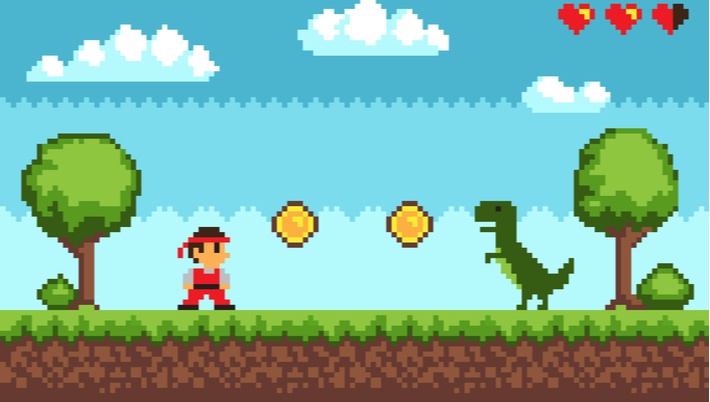Online casino and video games are generally not designed for educational purposes. They are designed to provide gamers with some Vegas casino fun entertainment and give overwhelmed parents a few moments of quiet.
Until recently, if you were looking for ways to promote a more successful educational environment, you wouldn’t have placed the child in front of a video game console as an educational strategy.Today, educators are learning that, contrary to the reputation for rotting kids’ brains, video games can actually serve as a useful educational tool.
In a study conducted in The Netherlands and published in the journal of the American Psychological Association, researchers found that playing video games promotes better acquisition and retention of material and creates a better overall learning environment.
While the study focused mainly on the mental health benefits and social skills attained from these games, researchers determined that video game play has the potential to strengthen cognitive skills including spatial navigation, memory, perception problem-solving skills and reasoning that support intellectual achievement.
This is especially applicable to the COVID-19 remote learning model where children are trying to learn while sitting in front of a screen. Adding video gaming to the school schedule can facilitate a more effective learning environment.
Social Aspects
One of the biggest drawbacks to distance learning is the isolation that many students experience when they don’t interact with peers. In America, one school district is weighing returning to in-school learning because of the mental stress that students are under from learning at home – the suicide rate among the district’s students increased so dramatically that officials felt that it may be less-dangerous to bring the students back to school despite the dangers of COVID-19 infections.
Many video games, even the silly ones, involve players who work together in teams as they compete against other teams and strive to achieve goals (or both). They must communicate and refine interpersonal skills in order to progress. Such pro-social behaviors promote the good peer relationships and high self-esteem needed to achieve in school.
Cognitive Skills
Video games have been shown to improve students’ reading comprehension and thinking skills. Thanks to today’s fast-moving world of Internet, students aren’t as motivated by traditional educational reading materials and that lack of motivation can stymie their advancement in their studies.
Video games can make material more engaging and relevant for students while building up the same kind of reading and comprehension skills that they’d get by reading Odysseus, Shakespeare or even Mark Twain. In a video game, the student immerses him/herself in a different culture or a place or puts him/herself into the role of a character.
Through these interactive experiences the students experience better understanding and retention of the material that’s being presented.
Experienced educator Paul Darvasi, who focuses on intersections of learning, technology, games and narratives, wrote in an article for KQED, “Alternate reality games (ARGs) can be used as an immersive learning system that combines rich narrative, digital technology, and real-world game play. Students must exercise critical thinking, resilience, and creative problem solving to succeed in an ARG.”
Individualized Learning
Providing an individualized learning strategy is every teacher (and parent’s) dream. Each student learns in a different way – some students are auditory learners, some are visual learners, some rely on memorization, etc. Time and resource constraints, however, make individualized learning plans a pipe-dream. Video games, however, can make individualized learning a reality.
When a student is involved in a game s/he can learn at his/her own pace with advancement from one level to the next dependent on the player’s performance and preferences. Players who succeed at one level move up to the next level so the challenges become more stimulating, interesting and thought-provoking.
Many games present the same concept in varying contexts so that the student has time and multiple opportunities to master the knowledge and skill needed to move forward. Jan Plass, a professor of digital media and learning sciences at NYU, wrote in A New Paradigm for Education for the CREATE lab at the NYU-based Games for Learning Institute “By balancing gameplay enjoyment with an appropriate level of challenge, games have the ability to keep players in their own unique optimally challenging and engaging zone for learning.”
Technical Skills
STEM is the term on every educator’s mind as a way to prepare students for the new world of technology. There are few other ways as inviting to get kids interested in technology as video games. Video games teach basic technological skills in a way that demonstrates the real-world application of such abilities while imparting memory-building skills, perception, reasoning, spatial thinking and problem solving proficiencies.
Assessment
Assessing student progress is a vital component of any educational program. Instead of quizzes and tests, which only show a small part of a student’s progress, video games offer highly detailed statistics through data that is collected, in real time, that documents every step of a student’s learning. Through this type of assessment the evaluator can better understand how the child is interacting with the material and can offer immediate feedback.
Curriculum
Video game theory can also be used by teachers who want to use the principles of video game design to write curriculum. That’s what teachers at the Quest to Learn public school in NYC have been doing since 2009. They organize curriculum into missions and quests to give students multifaceted challenges that encourage them to explore solutions by making choices. The “questions” often have more than one answer, as with life itself.
Through video games, educators can better engage and excite their students about the material, provide immediate feedback to promote the learning PROCESS, give kids more personal attention and help students develop important learning skills. At present, the field is brand new and educators are just beginning to explore the potential that video games offer to build a new paradigm for education.


